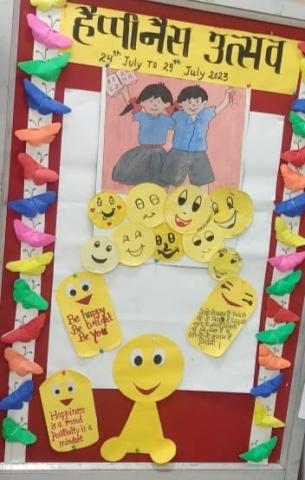
A Blueprint for a Brighter Future: 5 Years of Delhi's Happiness Curriculum
It has been five years since the implementation of the Happiness Curriculum in Delhi government schools, and the occasion is marked by the forthcoming Happiness Festival set to commence next week. This initiative has garnered global attention, attracting reputable institutions like BCG consultancy and the Brookings Institute, who conducted studies to understand its impact on students' lives. The stories related to the Happiness Curriculum continue to make headlines, and rightfully so. For the first time, a progressive intervention has been introduced at a significant scale, reaching all government schools in Delhi, breaking the traditional barriers that confined such approaches to private institutions within controlled environments. Notably, this pioneering move is shifting from the government schools to the private schools, with many schools now adopting the Happiness Curriculum Framework developed by the SCERT Delhi.
As we celebrate five years of this groundbreaking curriculum, it is time to reflect on crucial questions concerning the impact of social and emotional learning (SEL) – the popularly known Happiness Curriculum – in schools.. Is it merely an addition of a new subject? Who is in need of happiness - the teachers or the students? Is the pursuit of happiness a worthwhile goal that schools should prioritize? Or is happiness something intrinsic, transcending boundaries?
Many of these questions stem from a slight misunderstanding of the concept of happiness. Emotions are universal, shared by teachers and students, rich and poor, men and women, children and adults alike. We all experience emotions such as anger, sadness, love, jealousy, and so on. At any stage of life, we cannot claim complete control over our emotions or claim to fully understand them. Thus, the need to comprehend and manage emotions is also universal. SEL, which is at the core of the Happiness Curriculum, applies to every individual. It's not just for teachers or students, the rich or the poor. We must break the binary perspective and embrace SEL as a universal lesson essential for all.
But how can we integrate SEL into the existing school curriculum?
The introduction of SEL as a new curriculum was a commendable step. However, now it's time to take it beyond a standalone subject and infuse it into every aspect of education. The question arises: are we here to teach subjects or students? When we prioritize teaching students, SEL becomes the underlying need in every classroom. The problem emerges when we focus solely on teaching subjects, leading to the perception of the Happiness Curriculum as an add-on, something extra. But when we shift our approach and focus on teaching the child as a whole, the knowledge of SEL becomes indispensable. A math teacher, for instance, cannot effectively teach mathematics without understanding the emotional and social state of the child. The integration of SEL across disciplines is imperative for a holistic education.
The past five years have witnessed transformative developments, and social and emotional learning has emerged as a fundamental need in educational institutions. The pandemic exposed the fragility of people's ability to manage their emotions, giving rise to a global demand for experts in this field. In this context, the Happiness Curriculum in Delhi Government schools has proven to be prophetic. Children's stories abound with examples of how they managed difficult times at home, supporting their parents in coping with financial and personal losses.
Moreover, the rapid advancement of internet-enabled technology has shifted us to a new paradigm. Research suggests that people spend more than six hours on screens daily. Increased screen time often leads to a diminished sense of control over one's life. As technology continues to permeate our daily lives, self-control becomes paramount. And one cannot envision self-control without a deep understanding of SEL concepts.
The celebration of the Happiness Curriculum's five-year milestone in Delhi Government schools presents an opportunity for us all to ponder how we can take it further and make it an integral part of everyone's life. How can we break the binary limitations surrounding the curriculum and integrate it seamlessly across disciplinary boundaries? The journey of change begins with asking the right set of questions.
- Log in to post comments
